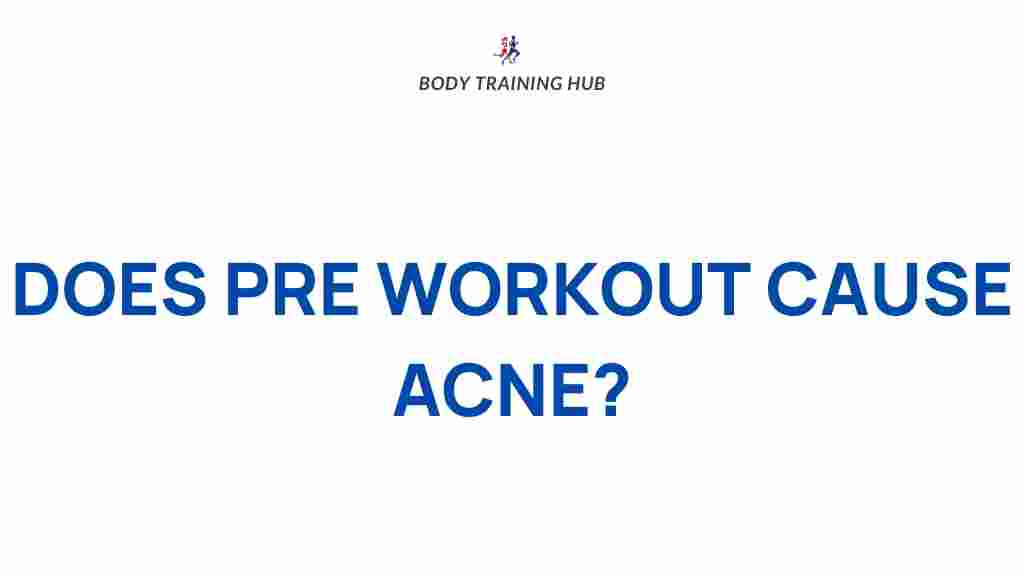Unveiling the Truth About Pre-Workout Supplements
In today’s fitness world, pre-workout supplements have become a staple for athletes, gym enthusiasts, and bodybuilders alike. Whether you’re aiming to boost endurance, strength, or focus, pre-workout products promise to enhance your exercise experience. However, with a multitude of options on the market, it can be overwhelming to determine whether these supplements live up to the hype. In this article, we will delve into what pre-workout supplements are, how they work, their potential benefits, and what you should consider before incorporating them into your fitness routine.
What Are Pre-Workout Supplements?
Pre-workout supplements are formulated to enhance performance during exercise. Typically consumed 20-30 minutes before a workout, they often contain a blend of ingredients designed to improve energy, endurance, strength, and focus. These ingredients can range from stimulants like caffeine to amino acids and nitric oxide boosters.
Common ingredients found in pre-workout supplements include:
- Caffeine: A well-known stimulant that boosts energy and focus.
- Creatine: Known for enhancing strength and muscle power.
- Beta-Alanine: Helps reduce muscle fatigue and improve endurance.
- L-Citrulline: Improves blood flow and nutrient delivery to muscles.
- BCAAs: Branched-Chain Amino Acids support muscle recovery and reduce soreness.
How Does Pre-Workout Work?
The primary goal of a pre-workout supplement is to increase performance during exercise. Let’s take a closer look at how the ingredients in these products help achieve that:
- Boosts Energy: Stimulants like caffeine are commonly included to increase alertness and energy levels, allowing you to push through intense workouts.
- Improves Endurance: Beta-Alanine helps buffer acid buildup in muscles, which reduces fatigue and allows you to exercise longer.
- Enhances Blood Flow: Nitric oxide boosters such as L-Citrulline improve blood circulation, delivering more oxygen and nutrients to muscles during exercise.
- Supports Muscle Growth: Ingredients like creatine and BCAAs promote muscle recovery and growth, reducing soreness post-workout.
Potential Benefits of Pre-Workout Supplements
When used properly, pre-workouts can offer several key benefits:
- Increased Energy and Focus: The caffeine and other stimulants in pre-workouts can help improve focus, making it easier to stay engaged during your workout.
- Enhanced Strength and Power: Many pre-workouts contain ingredients like creatine that are known to boost muscle strength.
- Improved Endurance: With ingredients like beta-alanine, pre-workout supplements can help you push through longer workout sessions.
- Faster Muscle Recovery: BCAAs and other amino acids help reduce muscle soreness, promoting quicker recovery times.
Are Pre-Workout Supplements Safe?
Like any supplement, pre-workouts come with potential risks and side effects, especially when not used properly. Some common concerns include:
- Overstimulation: Consuming too much caffeine or other stimulants can cause jitteriness, anxiety, and sleep disturbances.
- Digestive Issues: Some users report stomach upset or nausea after taking certain pre-workouts, particularly those with high doses of stimulants.
- Overtraining: Relying too heavily on pre-workouts may encourage excessive exercise without adequate rest and recovery.
Before using a pre-workout, it’s important to consider your tolerance levels and consult a healthcare professional if you have any underlying health conditions.
How to Choose the Right Pre-Workout
With so many pre-workout options on the market, choosing the right one can feel daunting. Here are a few tips to guide your decision:
- Assess Your Goals: Are you looking to boost energy, improve endurance, or build strength? Select a product that aligns with your specific fitness objectives.
- Check the Ingredients: Look for supplements that contain well-researched ingredients like caffeine, creatine, and beta-alanine. Avoid those with excessive amounts of stimulants or fillers.
- Start with a Lower Dose: If you’re new to pre-workouts, begin with a smaller dose to assess your body’s reaction.
- Read Reviews: Customer reviews can provide valuable insights into the effectiveness and taste of a product. Visit trusted sources like Bodybuilding.com for more detailed feedback.
Common Troubleshooting Tips for Pre-Workout Users
If you’re experiencing issues with your pre-workout, here are some troubleshooting tips:
- Feeling Jittery or Anxious: This could be a sign of overconsumption of caffeine or stimulants. Try reducing the dosage or choosing a stimulant-free formula.
- Stomach Upset: Take your pre-workout with food to help prevent nausea. Also, consider trying a formula with fewer artificial ingredients.
- No Energy Boost: Ensure you’re not building up a tolerance to caffeine by taking breaks between pre-workout cycles.
When to Take Pre-Workout Supplements
Pre-workout supplements should be consumed approximately 20-30 minutes before exercise for maximum effectiveness. If you are working out in the morning, take your pre-workout after breakfast to avoid any potential digestive issues. Avoid taking pre-workouts too close to bedtime, as the stimulants may interfere with sleep.
Are There Alternatives to Pre-Workout Supplements?
If you’re hesitant about using pre-workouts or are looking for natural alternatives, consider these options:
- Whole Foods: A balanced meal with carbohydrates, protein, and healthy fats can provide natural energy for your workout.
- Green Tea: A natural source of caffeine and antioxidants, green tea can provide a mild energy boost.
- Hydration: Sometimes, simply drinking water before your workout can prevent fatigue and improve performance.
Conclusion
Pre-workout supplements can be an excellent tool for enhancing exercise performance, but they are not a one-size-fits-all solution. By understanding the ingredients, benefits, and potential side effects, you can make an informed decision about whether to incorporate a pre-workout into your fitness routine. Remember, the ultimate key to progress lies in consistency, balanced nutrition, and proper recovery. If you’re unsure about what’s right for you, consulting a fitness professional or healthcare provider can help ensure you’re making the best choice for your health and goals.
For more information on fitness supplements and their benefits, check out resources from the National Institute of Health.
This article is in the category Myths & Facts and created by BodyTraining Team
